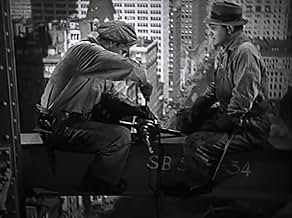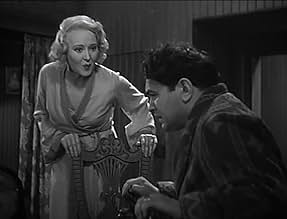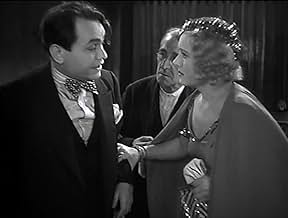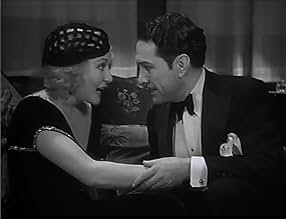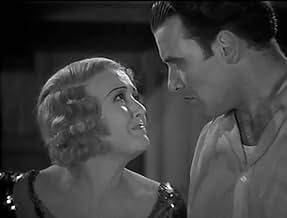Adicionar um enredo no seu idiomaA condemned murderer, in the process of being executed, relives the events that led to his being sentenced to die in the electric chair.A condemned murderer, in the process of being executed, relives the events that led to his being sentenced to die in the electric chair.A condemned murderer, in the process of being executed, relives the events that led to his being sentenced to die in the electric chair.
- Direção
- Roteiristas
- Artistas
- Prêmios
- 2 vitórias no total
- Tony
- (as J. Carroll Naish)
- Reporter
- (não creditado)
- Tart
- (não creditado)
- Annie
- (não creditado)
- Priest
- (não creditado)
- Mrs. Smith - Landlady
- (não creditado)
- Direção
- Roteiristas
- Elenco e equipe completos
- Produção, bilheteria e muito mais no IMDbPro
Avaliações em destaque
The story plays out on the hard times of the Great Depression, when jobs and money are in short supply, to say the least. The fact that Allen's got a good job places him somewhat on a pedestal, and except for lack of a social life he's pretty well insulated from what millions of others are experiencing. Thus his story stands as something a tragedy, brought about indirectly by that same Depression that now seems inescapable.
The premise of a two-second flashback's an imaginative one. Another reviewer suggests the movie's too short for its threads, and I agree. The screenplay has some unexpected twists, so daring to think outside the box is not a problem, especially in that pre-Code year (1932). Happily, there's plenty bouncy music from that era along with dancing couples. Times may be tough, still folks need relief. For fans of Robinson, Allen is totally unlike any role I've seen him in. At first the character's poignantly reserved, but soon wobbles into a directionless paranoia and finally into florid hysterics. I suspect it's not a role the actor fondly remembered.
Anyway, the 60+ minutes remains an interesting oddity of the time, mainly for its twisty and revealing development.
With Mervyn Leroy you'd expect superb direction, and that's what you get. This is so stylishly shot too. Even though there are no expensive sets - after all this is 1932 WB we're talking about - a lot is done with a little. Take the scene in the courtroom with only the sound of a fan at first, Eddie G. in what looks like a spotlight with the rest of the courtroom dark except for the judge's face - we're talking prototype noir here both in substance and style. From the baby face of William Janney that we see in the first frame to that same face full of wonder in the last, this thing is expertly constructed as the flashback of a man about to be executed who has "two seconds" to live his life over from the time the electricity floods his body until his brain stops functioning. Highly recommended.
Best precode moment:Shirley has dragged a drunken - but now married - John back to his apartment. Her first act as John's wife is to kick Bud out for good. Before Bud even has packed his stuff and left, Shirley is stripping down to her undies. Mind you, this is a one room flat. You can only assume she is going to consummate this marriage pronto before John has a chance to sober up and cry "annulment". As a parting shot of regard Bud finishes a cigarette he is smoking and tosses it on to her already bare back as she is raring to go as soon as Bud is out of the room...that is, I'd assume she'd wait until he left the room! Hot stuff from WB.
*** (out of 4)
Interesting Warner drama about a man (Edward G. Robinson) about to be executed in the electric chair. Before the execution a doctor tells the people watching that he will live for two seconds after the switch is pulled and in those two seconds his entire life will flash before his eyes. His entire life doesn't but we see how he ended up in this situation, which is do to falling for a questionable lady (Vivienne Osborne). I was happy to finally get the chance to see this after hearing some nice things about it over the years. For the most part the film does live up to its reputation as being a pretty strong pre-code that has some nice performances wrapped around a downbeat story. I think the best thing the movie has going for it is the performance of Robinson who really digs deep in a role many won't expect to see from him. I was really surprised to see Robinson handle the role of an every day's man who simply goes to work and comes home without much fan fair. I thought the actor was very believable in the role and he certainly made you feel for the character especially after the certain events take place and change his life. Osborne is also very good as she too perfectly fits in the role and really delivers as being that "nice guy" Robinson falls for only to quickly change into a snake. Guy Kibbee has a brief supporting role as does J. Carrol Naish and Preston Foster as the best friend. I think the film does go a bit over the top towards the end in regards to everything plays out. I won't spoil anything but what takes place with Robinson was just a bit too much for me but the courtroom scene was quite effective.
Well, a guy who looks like Edward G should know that the cutest girl in the room is not REALLY going to fall for him, but he takes the bait, and life goes downhill from there.
The film is told in an interesting fashion. It begins at the electric chair, and the events of the next hour are supposedly John Allen's flashbacks during the two seconds it takes to "fry."
Robinson does a nice job in the film, showing a lot of range from his usual swagger, to vulnerability, to sheer insanity. TWO SECONDS is fairly edgy in terms of content, coming two years before the Hays code cracked down on such things. It's worth a look to see Robinson doing something in the 30s besides playing gangsters.
Você sabia?
- CuriosidadesBud refers to a "Peggy Joyce" twice when talking to John about setting him up with dates. He is referring to Peggy Hopkins Joyce, a well-known actress, model, and dancer at the time, who had already married and divorced four (eventually six) wealthy men and led a lavish and scandalous lifestyle. At one point in 1928, she was so wealthy that she purchased the 127 ct. Portuguese Diamond for $373,000 ($6.58M in 2023). The diamond is in the Smithsonian's National Gem Collection.
- Erros de gravaçãoWhen John is talking to Bud while sitting on the building beam, he starts to slowly take off his work glove on his right hand. On the next immediate cut, the glove is completely off. Then, on each successive cut after that as he smokes a cigarette, he alternates between holding the cigarette with his left and right hand.
- Citações
College Boy at Execution: Look, Doctor, when that current's turned on, how long will it take before it's all over?
The Prison Doctor: You mean before I'll pronounce him dead?
College Boy at Execution: No, before he actually is dead. Will he pass out as soon as the current hits him?
The Prison Doctor: No.
Reporter: He won't? I thought it was all over just like that!
[He snaps his finger]
The Prison Doctor: Not with a powerful fellow like John Allen. His body will be paralyzed but his brain will continue to function for... maybe two seconds.
College Boy at Execution: Gee, those'll be the longest two seconds he ever lived!
The Prison Doctor: Long enough for him to relive his whole life!
- ConexõesReferenced in Public Enemies: The Golden Age of the Gangster Film (2008)
- Trilhas sonorasLucky Day
(uncredited)
Music by Ray Henderson
Lyrics by Lew Brown and Buddy G. DeSylva
Sung by Preston Foster
Also played when Bud and John are waiting for the bookie
Principais escolhas
Detalhes
- Data de lançamento
- País de origem
- Idioma
- Também conhecido como
- Two Seconds
- Locações de filme
- Empresa de produção
- Consulte mais créditos da empresa na IMDbPro
Bilheteria
- Orçamento
- US$ 310.000 (estimativa)
- Tempo de duração1 hora 7 minutos
- Cor
- Mixagem de som
- Proporção
- 1.37 : 1
Contribua para esta página




